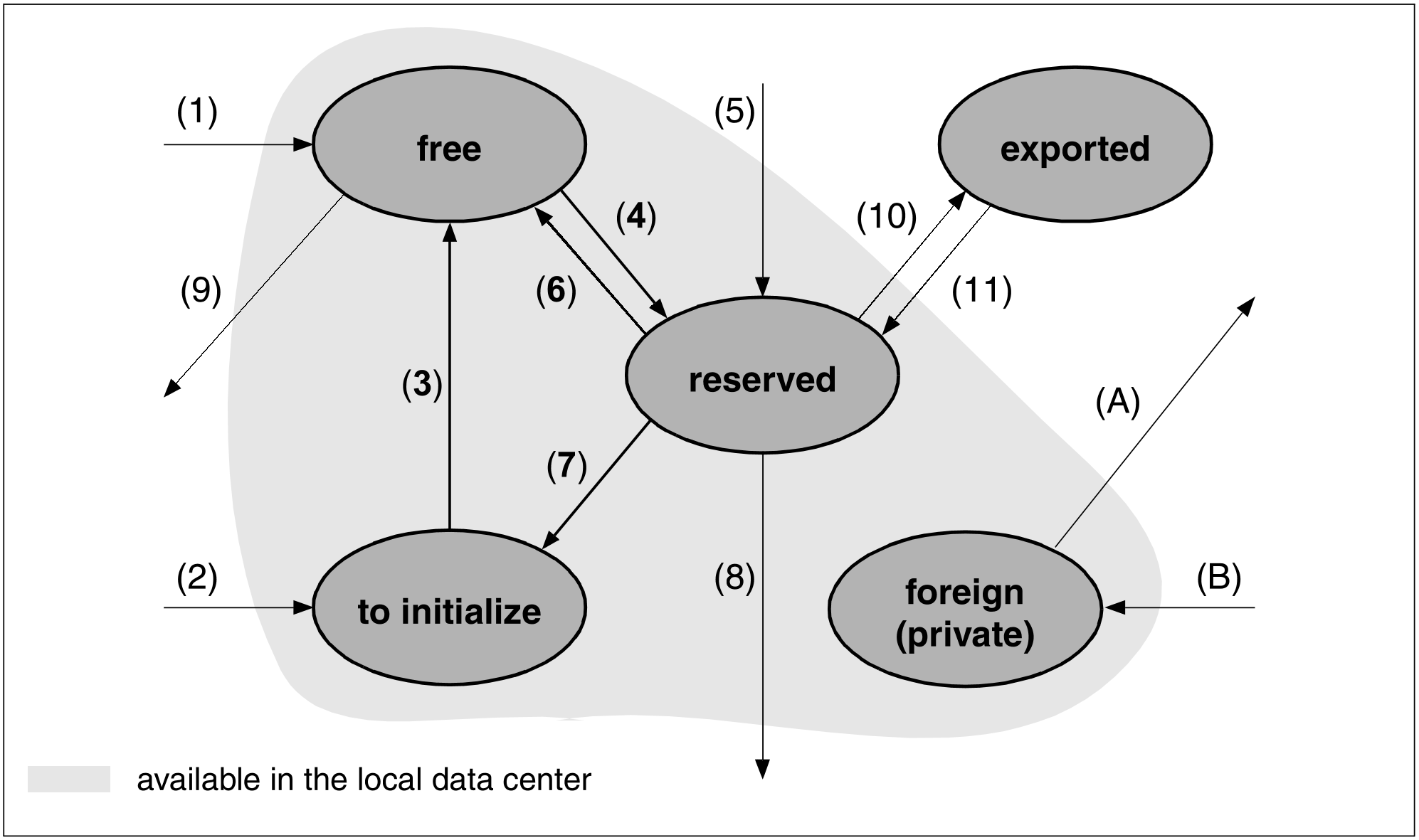Loading...
Select Version
&pagelevel(3)&pagelevel
A tape’s life cycle is basically characterized by constant alternations between the tape states “free” and “reserved”. Other states a tape might have are “to initialize”, “exported” and “foreign (private)”.
The states are represented by the following catalog entry fields in the MAREN catalog:
| free: | VOLUME-STATUS=FREE |
| to-initialize: | VOLUME-STATUS=RESERVED and USER-ID=SYSMAREN/<other id for volumes that are to be initialized> |
| reserved: | VOLUME-STATUS=RESERVED |
| exported: | VOLUME-STATUS=RESERVED and EXPORT-DATE=<date of last export> |
| foreign (private): | VOLUME-STATUS=PRIVATE |
Life cycle and states of a tape
| (1) | A free tape is included in the tape inventory of a data center with the ADD-FREE-VOLUMES statement. If the tape was already initialized for some prior use, it can be utilized right away. In the MAREN catalog, the tape is assigned VOLUME-STATUS=FREE. |
| (2) | A free tape (that needs to be initialized before it is used) is added to a data center’s tape inventory with the ADD-FREE-VOLUMES INIT=*YES statement. |
| (3) | A volume is initialized with the INITIALIZE-VOLUMES statement. In the MAREN catalog, the tape is assigned VOLUME-STATUS=FREE. |
| (4) | A free tape can be reserved with the RESERVE-FREE-VOLUMES statement. If MARENUCP automatic free tape allocation is activated, then it will implicitly reserve a free tape when no particular archive number is requested. In the MAREN catalog, the tape is assigned VOLUME-STATUS=RESERVED. |
| (5) | The ADD-RESERVED-VOLUME statement generates a catalog entry with VOLUME- STATUS=RESERVED for a tape that already exists in the data center but is not known in the MAREN catalog. |
| (6) | If a reserved tape has reached the expiration date, it can be released with FREE-VOLUMES. If it is to be reinitialized before it is used again, the operand INIT-FILE=*NONE is set. In the MAREN catalog, the tape is assigned VOLUME-STATUS=FREE. |
| (7) | With FREE-VOLUMES INIT-FILE=<anything-but-*NONE>, the tape has to be reinitialized before it is used again. The tape is reserved for a specific user ID until it is reinitialized (default: SYSMAREN ). The VOLUME-STATUS=RESERVED is retained for the time being. |
| (8),(9) | Tapes with VOLUME-STATUS=RESERVED or free tapes with VOLUME-STATUS=FREE can be removed from the tape inventory of a data center at any time (with the REMOVE-USER-VOLUMES or REMOVE-FREE-VOLUMES statement). The DELETE-VOLUME-ENTRY statement deletes a catalog entry with any status. |
| (10),(11) | Reserved tapes can be exchanged with a remote data center. This is done with the aid of the EXPORT-VOLUME and IMPORT-VOLUME statements. Exported tapes cannot be used in the local data center. |
| (A),(B) | A tape from a remote data center can be used temporarily in the local data center. It has to be exported from the foreign computer center (EXPORT-VOLUME statement in the foreign computer center) and imported in your own computer center with the IMPORT-FOREIGN-VOLUME statement for that purpose. In the MAREN catalog, the tape is assigned VOLUME-STATUS=PRIVATE. The foreign tape is exported again from the MAREN catalog of the local data center with the EXPORT-VOLUME statement. |

